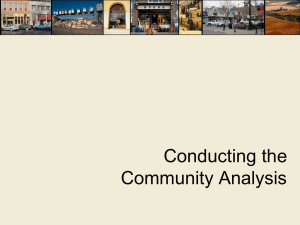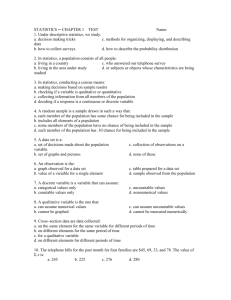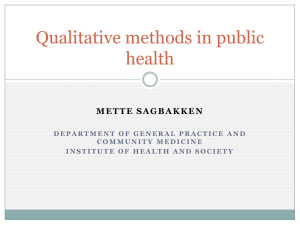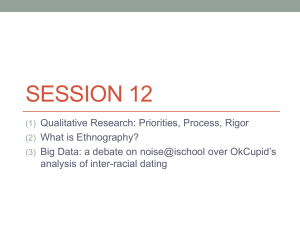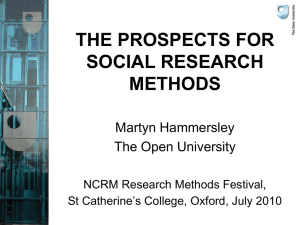Introduction
advertisement
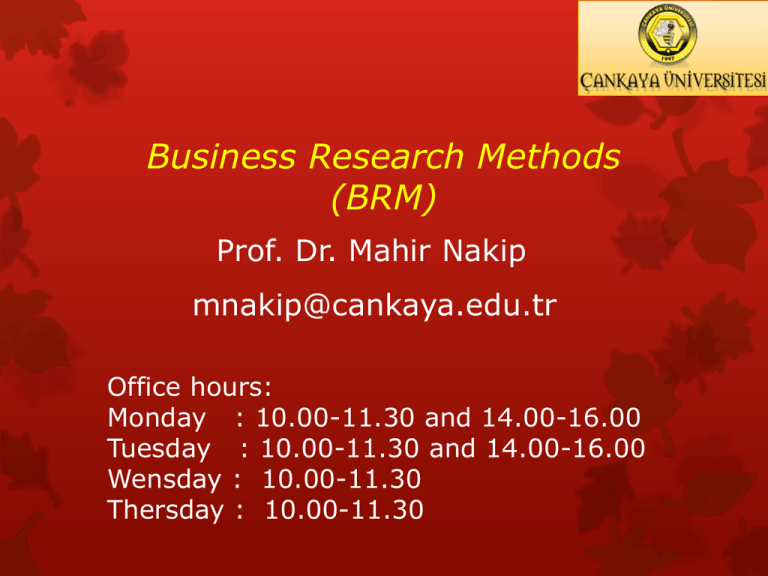
Business Research Methods (BRM) Prof. Dr. Mahir Nakip mnakip@cankaya.edu.tr Office hours: Monday : 10.00-11.30 and 14.00-16.00 Tuesday : 10.00-11.30 and 14.00-16.00 Wensday : 10.00-11.30 Thersday : 10.00-11.30 Teaching Sources 1. Main Source: Business Research Methods Zikmund, Babin, Griffin Eighth Edition, 2010 2. Main Source: Marketing Research an Applied Approach Naresh Malhotra and David F. Birks Second European Edition, 2006 3. Auxiliary Source: Pazarlamada Araştırma Teknikleri Prof. Dr. Mahir Nakip Seçkin Yayın Evi Üçüncü Baskı, 2013 The main purpose of teaching this course is…. - to teach the students how to conduct a research in international business field, - how many research types there are, - how to apply international research methods, - what does it mean secondary and primary data, - how many stages a research process have, - how can prepare survey and observation questionnaire, - what does it mean sampling and where should be used - how hypothesis can be designed, - how SPSS package program can be used, - how many statistical methods can be used in interpreting the findings? - How to write an international business report? This Course Gives What to the Students? 1. Elementary information in how to design an international research plan or proposal 2. Basic information in scientific international business research sources. 3. How to reach secondary data and get benefit of it? 4. What does it mean primary data, qualitative and quantitative data 5. Preparing a questionnaire and conducting survey methods to collect original data 6. Using hypothesis testing, Chi-Square, regression, correlation and variance analysis to solve business problems. 7. Using statistical package program such as SPSS 8. Writing an international business report or essay Mid term examine Style: Classic, three to five questions Weight: 40% Final examine Style: classic, three to five questions Weight: 50% Assignment Style: Short essay, solving statistical problems, short research paper Weight: 10% 1. WEEK: An Introduction to International Business Research Methods - The Nature of International Business Research - Some Basic Definitions Related to IBRM - Decision-making process -International Business Research & Ethics -Calssifications of IBRM -Research suppliers and services -International Business Research Process 2. WEEK: International Business Information and Support System - Some basic definitions - The Characteristics of Valuable Information - International Knowledge Management - Business problem definition and process - Types of variables - Proposal as a planning tool - Information Technology - Research design definition & calssification - Experiments - Theory in international business research 3. WEEK: Secondary data collection - Secondary data types - Advantages & disadvantages of secondary data - Criterias for evaluating secondary data - Classification of secondary data - Computerised database - Syndicated sources of secondary data - Internal data sources - Geodemographic data - Data Warehouse 4. WEEK: Qualitative Research 1. Definition and uses of qualitative research 2. When qualitative research be used? 3. Qualitative versus Quantitative research 4. Categories of quantitative research 5. Ethnography 6. Grounded Theory 7. Philosophy and quantitative research 8. Calssification of quantitative research 9. Focus group 10. Depth interviews 11. Social networking 12. Projective techniques 5. Week: Sources of Secondary Data and Qualitative Data Analysis 1. 2. 3. 4. 5. 6. 7. 8. Sources of Internal and Proprietary Data External Data The process of qualitative data analysis Using computers in qualitative research and analysis Package programs used in qualitative researches Advantages of computer-assisted qualitative data analysis Disadvantages of computer-assisted qualitative data analysis How to Write a Research Paper? - Choosing Your Topic - Researching - Making an Outline - Writing Your Paper 6. WEEK: Primary Data and Data Collecting Techniques 1. 2. 3. 4. 5. 6. 7. 8. Primary data Classification of Survey Methods Telephone interviews Personal Face to Face Traditional mail interviews Internet Surveys Pretesting Observation




